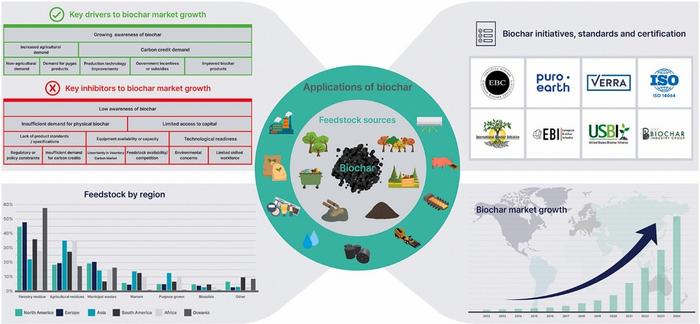In an era defined by urgent climate imperatives and escalating environmental challenges, sustainable biochar emerges as a transformative solution with profound implications across industries. A pioneering study, led by Professor Yong Sik Ok and soon to be published in the prestigious journal Renewable and Sustainable Energy Reviews, offers the first comprehensive market-driven analysis of biochar’s role as a carbon-negative technology, intricately aligned with Environmental, Social, and Governance (ESG) frameworks and the United Nations Sustainable Development Goals (SDGs).
Professor Ok, a globally recognized authority in environmental sciences and ESG initiatives, highlights that despite promising laboratory results, the transition from experimental frameworks to industrial-scale deployment remains sluggish. He underscores that unlocking biochar’s full potential requires not only technological refinement but also robust policy interventions and international cooperation. Smart governance and cohesive regulatory strategies form the backbone of this transition, shaping a global biochar economy capable of delivering tangible climate benefits while simultaneously supporting corporate ESG reporting.
Detailed economic modeling within the study predicts that biochar markets will experience significant growth as industries seek sustainable carbon offset mechanisms. The research delineates how corporations, motivated by stringent net-zero commitments and investor scrutiny, are progressively integrating biochar into diverse climate portfolios. A striking example features Microsoft’s strategic six-year carbon credit agreement to source 95,000 tons of biochar-derived removal credits from a new facility in Mexico. This reflects a growing trend of technology giants harnessing biochar as a practical tool to meet Task Force on Climate-related Financial Disclosures (TCFD) requirements and ensure verifiable emissions reductions.
Similarly, Royal Dutch Shell is leveraging biochar in its soil enhancement programs, synergizing with its existing hydrolysis and hydro-conversion technologies to develop more sustainable value chains. These industrial adopters exemplify biochar’s evolving role not just as a sustainable soil amendment but as a pivotal component of circular economy strategies that emphasize resource efficiency, waste valorization, and carbon sequestration.
Technically, biochar production involves the thermal decomposition of biomass under oxygen-limited conditions, resulting in a stable carbon-rich matrix with diverse physicochemical properties tailored for specific uses. Engineered biochars, designed through guided synthesis techniques and supported by active learning algorithms, offer enhanced adsorption capacities for CO2, heavy metals, and organic contaminants, thus promising superior environmental remediation performance. These innovations render biochar an adaptable platform technology capable of addressing multifaceted sustainability challenges in soil management, water purification, and air quality.
The proliferation of biochar is anticipated to substantially contribute to global carbon budgets, providing a durable means of locking atmospheric carbon into terrestrial reservoirs for centuries or longer. Its role resonates deeply with international climate agendas, including the science-based targets and voluntary carbon markets, where biochar-based carbon credits are gaining traction as credible and verifiable assets. This facilitates a critical convergence of environmental stewardship, market incentives, and sustainable development.
Moreover, the interdisciplinary study undertaken by Professor Ok’s team integrates policy analysis with techno-economic assessments to draft actionable recommendations. These include incentivizing biochar production through subsidies and carbon pricing, standardizing measurement and verification protocols, and fostering public-private partnerships that expedite commercialization pathways. Importantly, the research stresses inclusive frameworks that empower developing economies, often rich in biomass residues, to capitalize on biochar technologies for both environmental and socioeconomic gains.
The study’s implications reverberate beyond the scientific community into global industry and governance realms. By positioning biochar at the intersection of environment and enterprise, it reframes the discourse on achieving net-zero emissions in a manner consistent with ESG criteria. This synthesis offers a blueprint for policymakers and business leaders alike, encouraging a paradigm shift from isolated innovations to systemic adoption that holistically advances sustainability goals.
Looking ahead, the commercialization of biochar heralds a resurgence of green technologies deeply rooted in natural carbon cycles yet enhanced by modern engineering and data analytics. As the global community intensifies climate action, biochar’s integration into comprehensive ESG strategies will be instrumental in accelerating decarbonization while fostering resilience within natural and built environments.
Ultimately, this landmark study does more than illuminate the prospects of biochar—it catalyzes a global momentum toward sustainable industrial innovation, redefining pathways to a carbon-negative economy that aligns profitability with planetary health. Amid mounting pressure for credible climate solutions, biochar’s ascendance signals a compelling synthesis of nature and technology poised to shape the future of sustainable development.
Subject of Research: Sustainable biochar development and commercialization aligned with ESG goals and carbon-negative technologies.
Article Title: Sustainable biochar: Market development and commercialization to achieve ESG goals
News Publication Date: 1-Jul-2025
Web References:
10.1016/j.rser.2025.115744
Image Credits: Credit: Reproduced from Ok et al. with permission from Renewable and Sustainable Energy Reviews
Keywords
Environmental management, Environmental engineering, Natural resources management, Sustainability, Applied ecology, Applied sciences and engineering, Environmental sciences, Climatology, Environmental chemistry, Climate change, Scientific community, Science communication, Scientific publishing, Scientific organizations
Tags: biochar agricultural applicationsbiochar carbon-negative technologybiochar in construction materialsbiochar market analysisbiochar waste management solutionscarbon capture utilization storageEnvironmental Social Governance frameworksindustrial-scale biochar deploymentrenewable energy biochar potentialscalability of biochar technologiessustainable biochar solutionsUnited Nations Sustainable Development Goals





